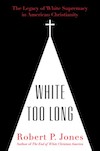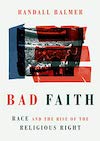As we reflect on the implications of the Trump years there have been several books exploring the convergence of white evangelical Christianity, right-wing nationalism, and Trumpism as it morphed into a virulent form white Christian nationalism. These books offer critiques of the roots of this religious phenomenon as it came into full bloom during the 2016 presidential election and subsequent Trump presidency.

White Too Long: The Legacy of White Supremacy in American Christianity
Robert P. Jones
Simon & Schuster
2020
White Evangelical Racism: The Politics of Morality in America
Anthea Butler
U of North Carolina Press
March 22, 2021
Christians Against Christianity: How Right-Wing Evangelicals Are Destroying Our Nation and Our Faith
Obery M. Hendricks, Jr.
Beacon Press
July 6, 2021
Bad Faith: Race and the Rise of the Religious Right
Randall Balmer
Eerdmans
August 10, 2021
But as Robert P. Jones astutely points out in White Too Long, evangelical Christianity isn’t the sole culprit in this entanglement between reactionary white resentment politics and Christianity; mainline Protestant denominations and American Catholicism have also exploited the racial anxiety and paranoia of their parishioners for continued societal currency.
Butler and Hendricks write from the Black Church tradition, which has long seen itself as a faithful critic of white Christian abuses of the faith, though the Black Church itself isn’t immune to many of the same “isms” that its white evangelical brothers and sisters have trafficked in over the centuries. Institutional classism, sexism, and homophobia have long been issues the Black Church has wrestled with.
Lest I fall prey to the charge of false equivalency between progressive Christianity, African-American Christianity, and that of the white Christian nationalist impulses of the religious right, I should point out that I wholly agree with these writers about the dangers posed by the increased intersection of political power with religious dogma that characterizes much of contemporary white evangelical Christianity. However, I cannot embrace the assessment of these authors that white evangelical Christianity is somehow a “false” Christianity and that these Christians are somehow not “real” Christians.
It’s here that I find the analysis of fellow RD contributor Chrissy Stroop insightful. She has consistently argued that the “fake Christian” label simply reinforces the notion of Christian supremacy:
“With respect to the ‘fake Christian’ tendency, dismissing anti-democratic and bigoted believers from ‘real’ Christianity is a convenient deflection tactic that serves to absolve more liberal Christians from the necessary work of grappling seriously with the ways in which they benefit from, and are complicit in, historical and contemporary Christian hegemony and its attendant violence.”
A recurrent theme throughout these texts is that right-wing white evangelical Christianity serves as a source of this nation’s current “sins” of racism, sexism, xenophobia and homophobia which therefore nullifies this brand of Christianity’s claim to being true followers of the Gospel of Christ.
While I personally find white evangelical Christians’ declarations about traditional American values, militarism, and uncritical patriotism to be hypocritical and self-serving, I believe there’s an evasion of a larger theological issue plaguing American Christianity. What progressive and right-wing evangelicals share is a common perception that they represent the true followers of Christ’s Gospel.
More importantly, both firmly elevate the divinity of Christ over the humanity of Jesus, hence we speak of Christianity not Jesus-ity. Meanwhile, the Christianity that prevails at any given moment is largely a matter of who has their hands on the levers of political power rather than a clear-cut theological victory in something akin to a medieval disputation.
Think of the popular catchphrase and acronym WWJD (What Would Jesus Do)? Even with centuries of historical criticism and attempts at the reconstruction of a historical Jesus, the notion of Jesus possessing the flaws of human perception isn’t seriously engaged in favor of the belief in Jesus as Christ, an essentially flawless human rather than simply a sinless human being. The circular logic employed requires followers to regard any action or utterance attributed to Jesus in the Gospels as beyond criticism because he is sinless; and because Jesus is sinless any action or utterance is beyond criticism.
While this makes for airtight claims to divinity, it’s made for some problematic theology in the American context. Simply put, what we witness in American Christianity is a battle over which Christianity represents Christ and his perfection, thus conferring ultimate and total authority upon opposing interpretations of the Christian faith.
Perhaps it’s my own Jewish experiences that allow me to favor Jesus’ humanity over Christ’s divinity. My own personal history with Jesus can be summarized as a slide from Christ the Son of God (Baptist) to Christ the Black Messiah (Hebrew Israelite), to a failed messiah (rabbinic Black Jew); and currently he’s my Galilean homeboy (No Affiliation). It’s also this background that allows me to view the Gospels with somewhat more suspicious, but still sympathetic eyes.
While most of Jesus’ actions are praise-worthy in the Gospels—for example when Jesus ‘reads for filth’ a group of Pharisees ready to punish a woman accused of adultery (John 7:53-8:11)—there are examples which call for a side-eye. The oft-cited Parable of the Good Samaritan, for instance, in which Jesus uses the tale to teach his disciples about the notion of brotherly love and care for one another. Christian hospitals, churches, and charitable organizations are proudly named after this parable without batting an eye.
However, as those familiar with Second Temple Judaism know, “good Samaritan” is less a compliment and more a generalization about an ethnic and religious rival. To make the point more clearly, think about how older Black folks during the Jim Crow era were fond of referring to white people who did not exhibit racist tendencies as “good white folks”—which implicitly means that most white people were known for somewhat less personable behaviors and traits.
What if Christians, particularly American Christians, were able to openly take Jesus to task for his throwin’ shade at the Samaritans, even as he extols the benefits of group solidarity in the face of an oppressive colonizing force represented by the Roman Empire? While this kind of hypocrisy may not reach the level of sin, this all-too-human trait of stereotyping or what we now call “othering” provides important lessons for Christians of all political persuasions.
In the Gospels the actions and utterances attributed to Jesus are excused or justified while the Pharisees, priests, disciples, first century Jewish religion or even Greco-Roman attitudes are cited as the source of classism, ethnocentrism, and sexism. This has the latent effect of reinforcing and reinscribing Christian supremacy, the very problem that Chrissy Stroop repeatedly warns about perhaps exemplified by her piece “Stop Trying to Save Jesus: ‘Fandamentalism’ Reinforces The Problem of Christian Supremacism.”
For an example of this radical humanizing of Jesus, I turn to African-American mystic, Howard Thurman, who unfortunately has been turned into a historical footnote in the life of Martin Luther King, Jr., relegated to simply being one of King’s professors at Morehouse College or mischaracterized as an empty vessel for the teachings and philosophy of Mahatma Gandhi’s brand of nonviolent resistance.
Philosopher Anthony Sean Neal in Howard Thurman’s Philosophical Mysticism: Love Against Fragmentation argues that, while Thurman’s biography has been plumbed quite deeply, his philosophy has received far less attention, particularly Thurman’s interpretative approach to the question of Jesus’ humanity and his own mystic journey in a Roman-occupied world full of social and political fragmentation. In 1937, well before the advent of Black Liberation Theology, Thurman writes in “The Significance of Jesus: Jesus the Man of Insight”:
“Christianity is an historical faith, the result of a movement that was started in time by an individual located in history… I am asking you to approach the life of Jesus stripped bare of much of the metaphysical and theological and mystical. Let us begin with the simple fact that Jesus of Nazareth was a Palestinian Jew.”
This declaration would be later reasserted in Jesus and the Disinherited, in which Thurman states, “It is a privilege, after so long a time, to set down what seems to me to be an essentially creative and prognostic interpretation of Jesus as religious subject rather than religious object.”
Philosopher of religion, John McClendon II argues that Thurman’s brand of Christian-philosophical humanism represents, “a radical break from the straitjacket of [traditional] Christianity because Jesus becomes entirely human as a poor Jew.”
While I think it’s far-fetched to believe right-wing Christians will either reconsider the humanity of Jesus vis-à-vis Christ’s divinity or that their desire for a white Christian theocratic state will be abandoned, it does require progressive Christians to abandon the notion that they represent a more authentic and inherently better interpretation of the Gospel.
Heeding Thurman’s call to follow the example of a more humble, less theologically triumphant, and (more importantly) flawed Jesus, would mitigate some of the inherent complicity with Christian hegemony in American Christianity. If progressive Christians can better wrestle with some of Jesus’ more problematic instances, perhaps progressive Christianity can better combat some of the more damaging effects of white evangelical Christianity.








